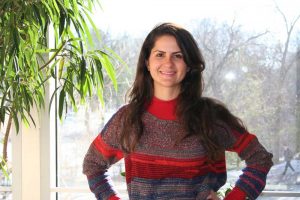
Ligia de Oliveira-Serrano aims to improve Brazilian research techniques
Originally from Brazil, agriculture and biosystems engineering graduate student Ligia de Oliveira-Serrano traveled to Iowa State in 2011 after receiving a scholarship to study internationally. While in Ames, she made many friends and learned about Iowa’s knowledge of agriculture.
De Oliveira-Serrano returned to Brazil a semester later and started working in an environmental company developing projects to determine the maximum pollution that could be generated and loaded into the environment by dairy plants. However, she noticed that environmental agencies in Brazil adopted outdated methods to make serious environmental decisions.
That inspired her to make a critical decision of her own. After graduating from Federal University of Vicosa, de Oliveira-Serrano returned to Iowa State to attend graduate school and learn about research advancements in conservation agriculture and the best ways to combine it with agricultural production.
De Oliveira-Serrano now studies the hydrology and drainage impacts of enclosed depressions in the Des Moines lobe. Enclosed depressions, or potholes, consist of lower elevation areas that tend to be more humid than the surrounds.
During summer, these features constantly flood after intense rainfall events, which make them more evident in the field. Because the depressions are located in high-production agricultural areas, some farmers drain the potholes to keep their fields dry.
De Oliveira-Serrano is investigating the effect draining the depressions has on crop yields, especially in areas where the potholes stay flooded enough to kill the vegetation within their extent.
She believes leaving these depressions undrained is more beneficial for the environment. When conserved, depressions allow filtration of runoff, which allows sediments to settle, leaving nutrients that can be used by plants. In contrast, drained depressions cause subsurface water to reach the pipelines, resulting in pollution problems in the outlets.
She hopes her research can prove to environmental agencies that potholes should be kept in their natural state. Going one-step further, she says farmers should receive incentives to keep depression drainage out of agricultural practices.
Though de Oliveira-Serrano did not know anything about her research upon arriving in Ames, her confidence has been increasing. “I know I can make the model run, and I’ve done everything myself. It’s challenging but rewarding to know I can do many things that would have scared me in the past.”
De Oliveira-Serrano believes learning new information is one of the best parts of being an engineer. She looks forward to educating people in Brazil about the advantages of agriculture upon her return.
In addition to her research, de Oliveira-Serrano has not only made new friends, she has been able reconnect with old friends from her 2011 studies. “These friendships will last a long time. Everyone I have met has created a rich environment for learning and growing.”
